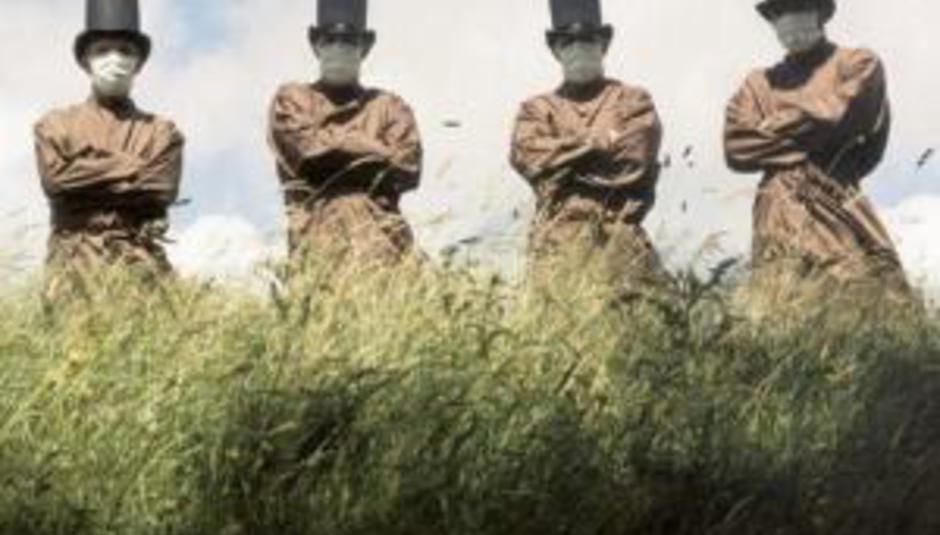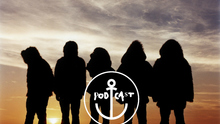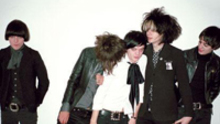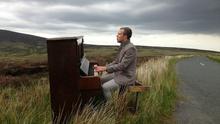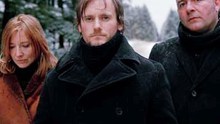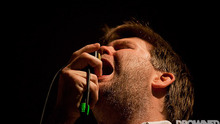Clinic released Do It, their fifth studio album, last month in typically understated fashion (review). Little press fanfare, a handful of live dates - you'd be forgiven for missing it. As usual, though, the Liverpool quartet have turned out another great record, one that sits comfortably with anything they've done since 2000's seminal debut LP Internal Wrangler.
Clinic's albums - all released by Domino - don't sound like many other bands' albums. If, as they claim, Do It is an attempt to go pop, it's not pop by conventional definitions: it's too artful, too good for that. This isn't music for the masses, then, but nor is Clinic a band for the masses. Or, indeed, the press. Interviews with Clinic are few and far between, and as such this conversation with Ade Blackburn (vocals/keyboard/melodica; the band’s completed by Brian Campbell, Hartley and Carl Turney) is an all-too-rare opportunity to delve into the fascinating world they've created for themselves. Roll the tape...

- - -
Clinic seem to exist in this sort of bubble, away from the glare of mainstream press/hype. Has that been deliberate on your part? You don't do many interviews, for instance...
Ade Blackburn: From the beginning we weren't really interested in following what was happening around us, and that's continued. I guess we've always been confident enough to follow our own path. I think what tends to happen with a lot of bands is that they'll latch onto a trend and then in a year or two be left with nowhere else to go.
I guess it's kind of ironic that, in those early days, you managed to get quite a lot of support from magazines - especially NME, despite the fact your first EP was called IPC Subeditors Dictate Our Youth...
AB: It wasn't an entirely serious, sloganeering title... it was a little bit tongue-in-cheek, that was maybe why they gave us some attention. And then we were able to back it up, it wasn't an attempt to gain some notoriety based on one song title.
Your sound has always been very distinctive in that it's hard to pick out specific reference points. But are there any current bands you've listened to and detected a Clinic influence?
AB: I think people have said along the way that they can hear influences in bands but I couldn't really say that. With us, though, it’s, like, this kind of spirit, this energy, and that goes all the way back to rock 'n' roll. Obviously other people can tap into that. I wouldn't make a claim of influencing anybody, though - other people are better judges of that than I am.
Going back to the reference points thing, I made a Captain Beefheart comparison in a review I wrote last year. Are you a fan?
AB: Yeah. I love things from that era, the late ‘60s. I love things which are out on a limb, like with Captain Beefheart, those rhythms and that sort of mutated blues, things which don't quite fit in with what people think of as psychedelic music.
The Clinic sound is something you seemed to nail on the first record and have built on since rather than altered drastically. Would you say working with Domino has given you the freedom to work like that?
AB: I'd say that's certainly a part of it. With each album there's been a different approach and different instruments used on it, but I always thought the main thing was for the songs to be strong. To change the style drastically on each album would be missing the point. I think if the music is strong in itself then that's not necessary.
You've described Do It as "the most pop we've done" - was that a conscious decision or just something that happened during the recording of the album?
AB: It was a conscious decision. The previous two albums (2004's Winchester Cathedral and 2006's Visitations) - although it wasn't a calculated approach, as it's always random how they come together - were quite dense and quite dark, I suppose, and I think with this we just wanted to take a different tack to allow the melodies to come out. So that when there's melodic sections they're not battling against distortion, for example... it just allows the vocals and the melodies a bit of space.
You mentioned the use of different instruments and techniques... what have you done differently this time around?
AB: The main thing would be how we put the songs together. We deliberately went away from the verse-chorus-verse structure with them and it means you often get a raw section right next to a melodic section, for instance. So it sounds madder, more cut-up. We wanted to shake things up.
I was listening to the new album today alongside Internal Wrangler and it struck me that those two records have quite a lot in common. Would you agree with that?
AB: Yeah. I think Do It is probably most similar to the early singles that we did, and Internal Wrangler, in terms of it being a bit more poppy. It's a bit more playful, and there's more humour - as there was with those two releases. In keeping with it being a bit brighter, we've also been wearing Hawaiian shirts with the masks.
That's maybe one thing that some people miss, the fact there is this tongue-in-cheek side to what you do...
AB: I think to some people the masks came across automatically as being something quite sinister whereas we always saw it as something humorous, almost a tacky pun, in the same vein as, say, The Monks or The Residents, just something entertaining. But I can see why to some people it would give the impression that it's sinister music.
In a previous interview I read you made the point that with a band like The Strokes, for instance, the decision to wear leather jackets on stage is just as deliberate...
AB: Especially now, I don't think there'd be many bands who'd go on stage in what they'd wear every day. It is more thought out, more stylised, than that.
Do you pay much attention to the scene in Liverpool?
AB: We rehearse in the same building as a lot of the current crop of Liverpool bands. It always goes in phases with Liverpool, if you look back six or seven years with bands like The Zutons and The Coral - there always seems to be something healthy coming through. There's a tradition of Liverpool doing its own thing, with that distance from London I think people tend to make their own minds up without just following what's in the press.
Have you got any hot local tips for us?
AB: Yeah, there's this band, I don't know if you've heard of them, called Mugstar. They've just released their first album, it's in a space-rock kind of vein but it's also quite ridiculous as well. They're definitely worth hearing.

- - -
Would you say Liverpool as a place has had much, if any, influence on your music? On the surface there seems to be very little geographic connection - it could be from anywhere...
AB: It could be from anywhere. There are so many bands in Liverpool who try to sound like The La’s or The Beatles, you know, and that's always made us want to go in the other direction, to make sure we're doing something unique. The things that influenced us naturally set us apart, whether that was what we wanted to achieve by playing gigs or what we took influence from. It was never contrived, or forced, but we all liked different music to what was typical in Liverpool.
Talking about Liverpool some more, it's this year's 'Capital of Culture' - would you say that's a status it deserves?
AB: I'd say it's as deserved as anywhere, really, but I don't believe in those awards - there's more political reasons behind them than cultural. I think cities like Liverpool, that have been run down for a while, need more ongoing support and rejuvenation than just this superficial type of award. It's inevitable that a lot of things won't be put in place to last, it's just to celebrate the year itself. There's a couple of opening ceremonies, and after that you think, “Well, where's the substance behind it?”
I was reading today about Beatles Day, in July, where people are supposed to buy mop-top wigs and inflatable guitars...
AB: I think a lot of it does hark back to The Beatles. To try and boost something culturally by going back to that seems... misguided. You had Ringo Starr doing something at the opening ceremony and Paul McCartney's playing a concert at Anfield in June or July so, you know, it continues to crop up - The Beatles are still the main focal point of it.
Talking of June, you're playing the Daydream Festival in Barcelona with Radiohead that month. They've been fans of yours for a while (the bands toured together in 2001) - have you kept in touch over the years?
AB: Yeah. They asked us to do it. Most recently we did a 6Music session, and Colin [Greenwood] from Radiohead was co-hosting with Marc Riley. It's just flattering for them to like what we do.
I'd say there are parallels in the way your bands operate. They've always stuck to their guns, artistically, yet somehow along the way became pretty much the biggest band in the world...
AB: You've got to admire that about them. They could have taken much easier routes to maintain their success but they always seem to challenge themselves and keep pushing it with each album.
What was your take on their decision to release In Rainbows in the way they did?
AB: I thought it was really good that there was no big build up to it. They just announced it a week or two before it was going to be available on the website. They didn't milk it at all. I read it was just something they felt they wanted to do rather than do it in any sensationalistic sort of way.
But then there was the subsequent physical release. Do you think that took away from it at all?
AB: I think Radiohead's audience probably covers quite a large age range, so I'd imagine there's a fair amount of their audience who wouldn't really bother with downloading, they'd rather have something physical. So I think that was a reasonable thing to do.
You released a free download single yourselves earlier in the year, 'Free Not Free'. The Clinic website seems to reflect something of the band's aesthetic - are you guys closely involved with it?
AB: Yeah. We're all involved in the website. Carl [Turney, drums] designed it, and we all contribute to the look of it. It seems like a logical thing to do, to actually be involved in everything to do with the band in a creative way rather than handing it over to an outside company.
Do you feel the internet's something to be embraced, then, as far as music's concerned?
AB: It's certainly a way of finding out about music from the past or present far more easily than scouring some record shops. It makes it much easier for people to investigate a band they hear on the radio, for instance.
Would you ever consider doing something along the lines of In Rainbows?
AB: I don't agree with us giving away music. If you're not a major band, you don't sell hundreds of thousands of albums, I think it's a fair thing that people should have to pay for your music. Money's still a major consideration for us, and that's the choice you make, I think, by doing music that's offbeat and not mainstream. We can't afford to give music away and say “Well, we still make money from touring”, because we don't play massive venues. That's the downside of illegal downloads - a lot of bands may not be able to afford to continue.
I saw you with Arcade Fire on their last arena tour - those were pretty massive venues. Did you enjoy it?
AB: I think doing something like that is often easier than doing a small club show. It's always really well run in terms of the sound and the stage. There aren't any restrictions on the volume you're playing at compared to the main band, either.
You played a handful of UK dates recently and now you're off to America. From past experience, how do the audiences compare?
AB: They're pretty similar actually. I think that because what we do is quite a niche type of music, the audiences over there and over here tend to be a bit more open minded, they're just music fans. It actually tends to be more like a party when we play our own gigs - people dance because we tend to weight the set towards the more groove based numbers. We've never been the kind of band to run the treadmill of endless tours, from the start we always felt we could be more creative by constantly writing new songs rather than making an album and then touring it for two years.
With that in mind, what does the future hold for Clinic? More of the same?
AB: Yeah. We've got into the routine of releasing a new album almost every eighteen months now, so as soon as we've finished the American gigs we'll just carry on. The writing always happens when we're back in Liverpool, but we've not started thinking about it yet. We don't like to plan too far ahead, it's always more random than that.
Video: Clinic, ‘The Witch’
- - -
Clinic’s Do It is out now via Domino. Find the band on MySpace here, where you’ll also find their US tour dates.
Large photos: Nick Scott

